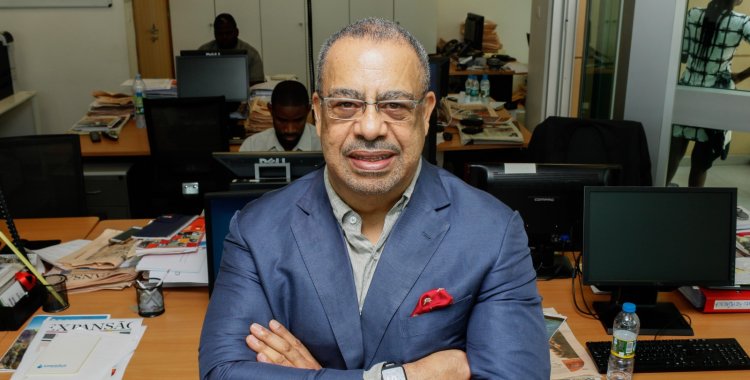"In the economic field, we went from heaven to hell, because in the elections (of 2022) everything was fine, the country was growing, we were going to accelerate growth, the kwanza was stable, inflation was controlled, public accounts were balanced and we were accountable that less than a year after the elections there is none of that after all", said the Angolan economist.
Speaking to Lusa, in the context of the first year of President João Lourenço's re-election, Rosado said that after that period the current inflation in Angola "is not under control, the kwanza is completely out of control, with an exchange rate crisis".
The public accounts, "are lagging, the external accounts have worsened and we cannot understand very well how it is that we went from heaven to hell in less than a year", he said, adding: "it is not us who say, it is the Government itself , which was obliged to adopt economic emergency measures, it is because something is wrong".
The President, João Lourenço, was re-elected in August 2022, for a second five-year term, after winning, as head of the list of the Popular Movement for the Liberation of Angola (MPLA), the general elections of 24 August of that year.
For Carlos Rosado de Carvalho, a year later, the Angolan authorities should clarify why the country "went from heaven to hell", considering that the Angolan economic policy, in that period, "was oriented to win the elections".
"We had high inflation, but what we did was to artificially value the kwanza (Angolan currency), we liberalized imports, and it is the State itself that imports", he noted.
He considered that said measures, which he classifies as artificial, brought "tremendous consequences in such a way that before the elections, in 2020, the kwanza was valued and even a dollar cost 400 kwanzas".
"And, at that time I spoke and said, but this was done with the sole aim of buying votes, the economic policy was oriented towards buying votes and now what is happening is that we are paying for this economic policy that has no other name, how irresponsible, which was made before the elections, that is the big question", he criticized.
The Angolan currency is currently registering a sharp depreciation, there is a shortage of foreign exchange, a rise in the price of basic basket products on the market and the Government announced, last July, a set of measures to mitigate the current macroeconomic scenario.
Measures to stimulate domestic production, such as the reduction of Value Added Tax (VAT) from 14 percent to 7 percent were announced, which has already been approved in general by parliament.
Rosado understands that the aforementioned "economic emergency measures", announced by the Government, are symptomatic that the current situation "is really worrying" warning, even, of the "big problem of public expenditure" in the country.
"We are currently producing just over a million barrels of oil / day, we have already produced 1.8 million barrels / day, oil is practically the only source of foreign exchange we have, now we cannot have the same life", he defends.
"Therefore, we have less revenue and the State has to lose weight, adapt to the new situation, to everything, except to touch public expenditure, in short, the Minister of Finance has been talking a lot about the quality of public expenditure in recent times, but she is talking is not doing", he shot.
Asked about the current world scenario and the respective implications for the Angolan economy, the journalist also says that there are indeed uncertainties, instability, war in Ukraine, "but in what concerns us, which is oil, our problems are different".
He recalled that the Government "made a (General State) Budget for 2023 based on 75 dollars, oil is above 80 dollars, we do not have these problems, the problems are different".
"One of the problems we have is that we are now starting to pay the public debt service, which had been suspended", he stressed.
The payment of the public debt "is nothing new, because we already knew when we were going to resume paying the debt, and what the Government did was spend everything instead of preparing for the resumption of debt payments".
Rosado also devalued economic diplomacy, promoted by João Lourenço, considering that it "failed" because there was no foreign direct investment in Angola.
"The President (of the Republic) travels to attract direct investment, we do not have foreign direct investment in Angola and from that point of view such economic diplomacy has also failed", he noted.
According to Rosado de Carvalho, economic diplomacy "has not brought the expected results so far because we have a bad business environment".
He also pointed to justice as a "fundamental factor" for creating a good business environment: "By the way, the worst classification we had in the World Bank's 'doing business' was precisely in the fulfillment of contracts".
The dismissal of the presiding judge of the Court of Auditors, for alleged acts of corruption, the ongoing investigation at the Attorney General's Office (PGR), on alleged fraudulent actions by the current president of the Supreme Court (TS), he recalled, "stop" the foreign investment.
"The President of the TS has an investigation in the PGR and even appoints a person as a judge of the TS, who was convicted of acts of corruption, so a country that does not have justice is a country that cannot have a business environment and foreign direct investment" , concluded Carlos Rosado de Carvalho.







